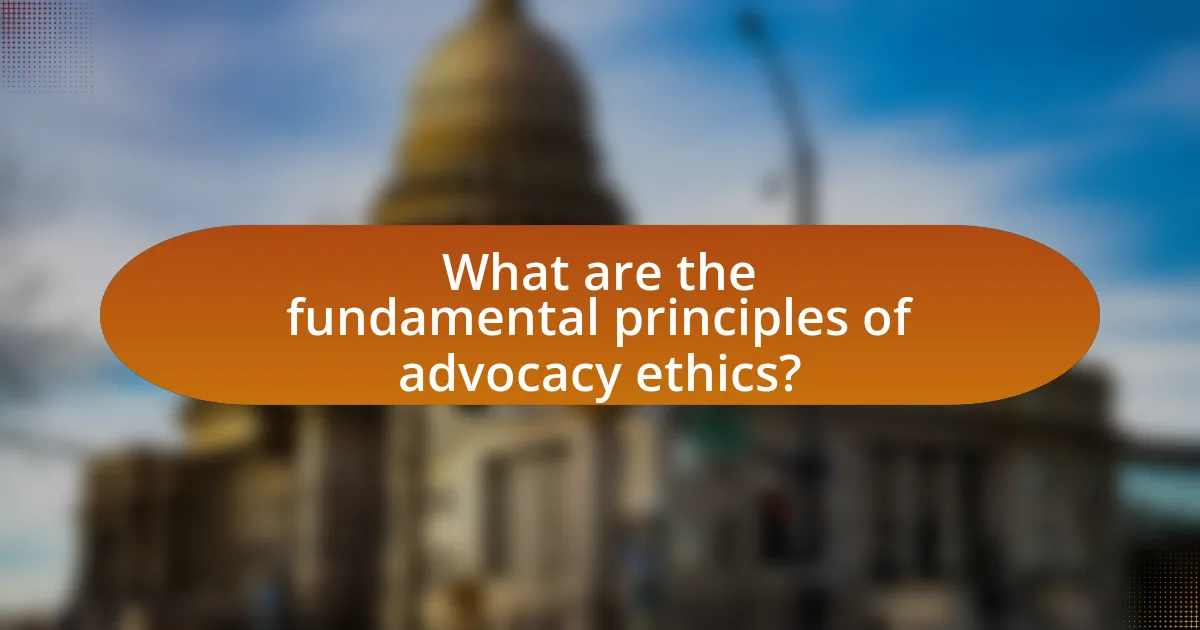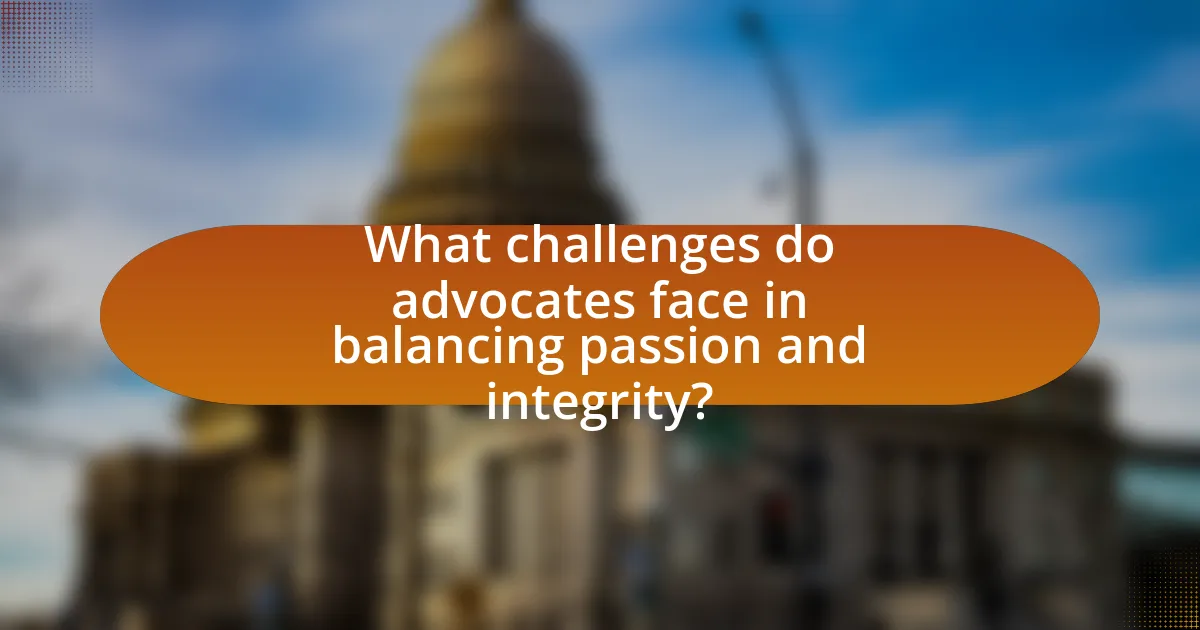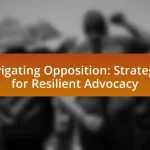The article focuses on the ethics of advocacy, emphasizing the critical balance between passion and integrity. It outlines fundamental principles of advocacy ethics, including honesty, integrity, respect for individuals, and accountability. The discussion highlights the intersection of personal conviction and ethical standards, the challenges advocates face in maintaining integrity, and the impact of ethical advocacy on public trust and policy-making. Additionally, it addresses common ethical dilemmas, strategies for navigating conflicts of interest, and best practices for upholding ethical standards in advocacy efforts.

What are the fundamental principles of advocacy ethics?
The fundamental principles of advocacy ethics include honesty, integrity, respect for individuals, and accountability. Honesty requires advocates to provide accurate information and avoid misleading statements, ensuring that their actions are transparent. Integrity involves maintaining consistency between one’s values and actions, fostering trust with stakeholders. Respect for individuals emphasizes the importance of treating all people with dignity, recognizing their rights and perspectives. Accountability holds advocates responsible for their actions and decisions, ensuring they are answerable to those they represent. These principles are essential for maintaining ethical standards in advocacy, as they guide advocates in their interactions and decision-making processes.
How do passion and integrity intersect in advocacy?
Passion and integrity intersect in advocacy by driving advocates to pursue their causes with commitment while adhering to ethical standards. Passion fuels the motivation to advocate for social change, inspiring individuals to dedicate time and resources to their causes. Integrity ensures that this dedication is grounded in honesty, transparency, and respect for all stakeholders involved. For instance, advocates who are passionate about environmental issues often engage in campaigns that promote sustainability, but their integrity is crucial in ensuring that they present accurate information and avoid misleading tactics. This intersection is vital for maintaining public trust and achieving long-term impact in advocacy efforts.
What role does personal conviction play in ethical advocacy?
Personal conviction serves as a foundational element in ethical advocacy by driving individuals to champion causes they believe in passionately. This intrinsic motivation enhances the authenticity and credibility of advocates, as their personal beliefs often align with the values they promote. Research indicates that advocates who are personally invested in their causes are more effective in persuading others, as their genuine commitment resonates with audiences. For instance, a study published in the Journal of Social Issues highlights that advocates with strong personal convictions are perceived as more trustworthy and relatable, which significantly impacts their ability to influence public opinion and policy. Thus, personal conviction not only fuels advocacy efforts but also reinforces the ethical dimensions of those efforts by ensuring that advocates remain aligned with their core values.
How can advocates maintain integrity while being passionate?
Advocates can maintain integrity while being passionate by adhering to ethical guidelines and prioritizing transparency in their actions. This involves consistently aligning their advocacy efforts with factual information and ethical standards, ensuring that their passion does not compromise their commitment to honesty and accountability. For instance, the American Psychological Association emphasizes the importance of ethical practice in advocacy, stating that advocates should avoid misrepresentation and ensure that their claims are supported by credible evidence. By doing so, advocates can effectively balance their enthusiasm for a cause with a steadfast commitment to integrity, fostering trust and credibility within their communities.
Why is ethical advocacy important in society?
Ethical advocacy is important in society because it ensures that the interests of individuals and communities are represented fairly and justly. This form of advocacy promotes transparency, accountability, and respect for diverse perspectives, which are essential for a healthy democratic process. Research indicates that ethical advocacy leads to more informed decision-making and fosters trust between advocates and the communities they serve, as seen in studies conducted by the American Psychological Association, which highlight the positive impact of ethical practices on community engagement and policy outcomes.
What impact does ethical advocacy have on public trust?
Ethical advocacy significantly enhances public trust by demonstrating integrity and accountability in communication and actions. When advocates adhere to ethical standards, they foster transparency and reliability, which are crucial for building trust with the public. Research indicates that organizations engaging in ethical advocacy experience higher levels of public confidence; for instance, a study by the Institute for Public Relations found that 70% of respondents are more likely to trust organizations that prioritize ethical practices. This correlation underscores the importance of ethical advocacy in establishing and maintaining public trust.
How does ethical advocacy influence policy-making?
Ethical advocacy significantly influences policy-making by ensuring that decisions are made based on integrity, transparency, and the public good. When advocates adhere to ethical standards, they promote trust among stakeholders, which is essential for effective policy development. For instance, research by the American Political Science Association indicates that ethical advocacy leads to more inclusive and representative policy outcomes, as it encourages diverse voices to be heard and considered in the decision-making process. This inclusivity can result in policies that better reflect the needs and values of the community, ultimately enhancing the legitimacy and effectiveness of governance.

What challenges do advocates face in balancing passion and integrity?
Advocates face significant challenges in balancing passion and integrity, primarily due to the emotional intensity of their causes and the ethical standards required in their work. The fervor for their mission can lead to biased decision-making, where personal beliefs overshadow objective analysis, potentially compromising ethical integrity. Additionally, advocates often encounter pressure to achieve results quickly, which can tempt them to employ questionable tactics that conflict with their moral principles. Research indicates that 70% of advocates report feeling torn between their commitment to their cause and the ethical implications of their actions, highlighting the pervasive struggle to maintain integrity while pursuing passionate advocacy.
What are common ethical dilemmas in advocacy?
Common ethical dilemmas in advocacy include conflicts of interest, misrepresentation of facts, and the challenge of balancing personal beliefs with the needs of the community. Conflicts of interest arise when advocates have personal or financial stakes that may compromise their objectivity, potentially leading to biased outcomes. Misrepresentation of facts can occur when advocates exaggerate or distort information to persuade others, undermining trust and credibility. Additionally, advocates often face the challenge of aligning their personal beliefs with the diverse perspectives and needs of the communities they represent, which can lead to ethical tensions in decision-making. These dilemmas highlight the importance of maintaining integrity and transparency in advocacy efforts.
How can advocates navigate conflicts of interest?
Advocates can navigate conflicts of interest by implementing clear ethical guidelines and maintaining transparency in their actions. Establishing a code of conduct that outlines acceptable behaviors helps advocates identify potential conflicts early. For instance, the American Bar Association emphasizes the importance of disclosing any personal interests that may influence professional judgment, which fosters trust and accountability. Additionally, seeking guidance from ethics committees or legal advisors can provide advocates with strategies to manage conflicts effectively, ensuring that their advocacy remains aligned with ethical standards.
What strategies can be employed to avoid ethical pitfalls?
To avoid ethical pitfalls, individuals and organizations should implement clear ethical guidelines and conduct regular training on ethical standards. Establishing a code of ethics provides a framework for decision-making and helps identify potential ethical dilemmas. Regular training ensures that all members are aware of these guidelines and understand their importance in advocacy work. Research indicates that organizations with strong ethical cultures experience fewer ethical breaches, as seen in a study by the Ethics & Compliance Initiative, which found that 70% of employees in ethical workplaces reported feeling empowered to speak up about unethical behavior.
How do external pressures affect advocacy ethics?
External pressures can significantly compromise advocacy ethics by influencing decision-making and prioritizing outcomes over integrity. For instance, advocates may face financial constraints, public opinion shifts, or political influences that compel them to alter their messaging or strategies, potentially leading to ethical dilemmas. Research indicates that when advocates prioritize external validation or funding sources, they may inadvertently sacrifice their core values and the authenticity of their mission, as seen in various case studies where organizations shifted their focus to align with donor interests rather than community needs. This dynamic illustrates the delicate balance between maintaining ethical standards and responding to external demands in advocacy work.
What role do funding sources play in ethical decision-making?
Funding sources significantly influence ethical decision-making by shaping the priorities and actions of organizations and individuals. When funding is tied to specific interests or agendas, it can create conflicts of interest that may compromise ethical standards. For instance, research has shown that organizations reliant on corporate funding may prioritize the interests of their sponsors over public welfare, leading to biased outcomes (e.g., studies by the Center for Science in the Public Interest highlight how food industry funding can affect nutritional research). Thus, the source of funding can dictate the ethical landscape within which decisions are made, impacting the integrity of advocacy efforts.
How can advocates resist pressure to compromise their values?
Advocates can resist pressure to compromise their values by establishing a strong ethical framework and maintaining clear boundaries. This involves defining their core principles and consistently aligning their actions with these values, which serves as a guide during challenging situations. Research indicates that advocates who engage in regular self-reflection and seek support from like-minded peers are better equipped to withstand external pressures. For instance, a study published in the Journal of Social Issues highlights that advocates who participate in ethical training programs report higher resilience against compromising their values under pressure.

What best practices can advocates adopt to uphold ethics?
Advocates can uphold ethics by adhering to transparency, accountability, and respect for all stakeholders. Transparency involves openly sharing information about intentions, funding sources, and decision-making processes, which fosters trust and credibility. Accountability requires advocates to take responsibility for their actions and decisions, ensuring they align with ethical standards and the interests of those they represent. Respecting all stakeholders, including opponents, promotes constructive dialogue and reduces the potential for conflict. These practices are supported by ethical frameworks such as the American Psychological Association’s Ethical Principles of Psychologists and Code of Conduct, which emphasize integrity and respect in professional relationships.
How can advocates develop a personal code of ethics?
Advocates can develop a personal code of ethics by reflecting on their core values, identifying ethical principles relevant to their advocacy work, and creating a written document that outlines these principles. This process begins with self-assessment, where advocates consider their beliefs about justice, fairness, and integrity. They should then research existing ethical frameworks in their field, such as the American Psychological Association’s Ethical Principles of Psychologists, which emphasize beneficence and non-maleficence. Finally, advocates should regularly review and revise their code to ensure it remains aligned with their evolving values and the needs of the communities they serve.
What elements should be included in an advocacy code of ethics?
An advocacy code of ethics should include elements such as integrity, transparency, accountability, respect for individuals, and commitment to social justice. Integrity ensures that advocates act honestly and uphold ethical standards in their work. Transparency involves clear communication about intentions, methods, and funding sources, fostering trust with stakeholders. Accountability requires advocates to take responsibility for their actions and decisions, ensuring they align with ethical principles. Respect for individuals emphasizes the importance of valuing diverse perspectives and treating all people with dignity. Finally, a commitment to social justice drives advocates to work towards equitable outcomes and challenge systemic injustices. These elements collectively guide ethical advocacy practices and promote a responsible approach to influencing public policy and social change.
How can self-reflection enhance ethical advocacy practices?
Self-reflection enhances ethical advocacy practices by allowing advocates to critically assess their motivations, biases, and the impact of their actions. This introspection fosters greater awareness of ethical dilemmas and encourages advocates to align their actions with core ethical principles, such as honesty and respect for others. Research indicates that self-reflection can lead to improved decision-making and ethical reasoning, as it helps individuals recognize the consequences of their advocacy efforts on diverse stakeholders. For instance, a study published in the Journal of Business Ethics found that reflective practices among advocates significantly increased their commitment to ethical standards and accountability in their work.
What resources are available for ethical advocacy training?
Resources available for ethical advocacy training include online courses, workshops, and certification programs offered by organizations such as the National Association of Social Workers and the American Bar Association. These programs provide structured learning on ethical principles, advocacy strategies, and case studies that illustrate best practices. For instance, the National Association of Social Workers offers a comprehensive online course titled “Ethics and Advocacy,” which covers ethical decision-making frameworks and real-world applications. Additionally, the American Bar Association provides resources through its “Advocacy Training” program, focusing on ethical considerations in legal advocacy. These resources are designed to equip advocates with the necessary skills to navigate ethical dilemmas while effectively representing their causes.
How can workshops and seminars improve advocacy ethics?
Workshops and seminars can improve advocacy ethics by providing structured environments for education and discussion on ethical practices. These events facilitate the sharing of best practices, case studies, and real-world scenarios that highlight ethical dilemmas faced in advocacy. For instance, a study by the American Society of Association Executives found that 85% of participants in ethics training reported increased awareness of ethical issues in their advocacy work. This increased awareness leads to more informed decision-making and adherence to ethical standards, ultimately fostering integrity within advocacy efforts.
What role do mentorship and peer support play in ethical advocacy?
Mentorship and peer support are crucial in ethical advocacy as they provide guidance, accountability, and shared experiences that enhance ethical decision-making. Mentorship offers advocates access to experienced individuals who can share best practices and ethical frameworks, thereby fostering a culture of integrity. Peer support creates a network of individuals who can discuss challenges and dilemmas, reinforcing ethical standards through collective reflection and support. Research indicates that advocates with strong mentorship and peer networks are more likely to adhere to ethical practices, as they benefit from diverse perspectives and constructive feedback, which are essential for navigating complex ethical landscapes.
What practical tips can advocates follow to maintain ethical standards?
Advocates can maintain ethical standards by adhering to transparency, accountability, and continuous education. Transparency involves openly communicating intentions and actions to stakeholders, which builds trust and credibility. Accountability requires advocates to take responsibility for their actions and decisions, ensuring they align with ethical guidelines and organizational values. Continuous education keeps advocates informed about ethical practices and legal standards, enabling them to navigate complex situations effectively. For instance, the American Bar Association emphasizes the importance of ongoing training in ethics for legal advocates, highlighting that informed advocates are better equipped to uphold integrity in their work.


